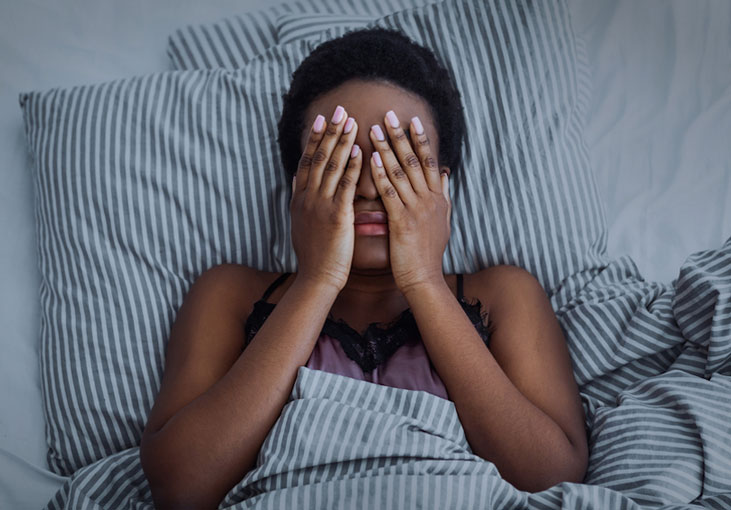Sleep is a foundation block of military health and wellness. Sleep impacts your performance in most aspects of Total Force Fitness (TFF)–physical, mental, social, nutritional, spiritual, medical, and financial fitness. Many Service Members have trouble sleeping, which can reduce readiness. Insomnia is a common issue among Service Members even at the early stages of their careers. About 1 in 6 military personnel with less than 4 years of service meet the criteria for insomnia, and many factors throughout a military career—deployment, traumatic brain injury, irregular sleep schedules—can contribute to higher rates. Insomnia can have immediate and long-term consequences on your health. Insomnia can hurt your physical and cognitive performance, lead to psychiatric conditions, and increase your risk of accidents, injury, and other health problems, such as obesity and diabetes.
What is insomnia
Insomnia isn’t simply having trouble falling asleep once in a while from using screens right before bed, having too much caffeine, or from other health problems that might keep you awake, such as chronic pain.
Signs that you might struggle with insomnia include:
- It takes you longer than 30 minutes to fall asleep
- You wake up in the middle of the night and stay awake for more than 30 minutes
- You wake up in the morning earlier than planned
- You feel fatigued and sleepy during the day
- You don’t perform at your usual level during the day
Insomnia can last a long time or be a temporary condition. Someone who has short-term insomnia has symptoms fewer than 3 times a week for fewer than 3 months. Someone with chronic insomnia has symptoms for 3 or more days a week that last for longer than 3 months or keep recurring over the years.
Insomnia isn’t the same as sleep deprivation. As a Service Member, you might go through phases in your career when you need to prioritize your mission over getting enough sleep. But these experiences don't mean you have insomnia. People who struggle with insomnia can't get enough sleep despite the opportunities and schedule flexibility to do so.
Cognitive behavioral therapy for insomnia
You should get professional help if you think you’re struggling with insomnia. It's important to get a proper diagnosis from your healthcare provider, since having trouble falling asleep—and staying asleep—could be related to other health problems. Plus, a qualified sleep specialist will be able to help get you the treatment you need for better sleep.
Cognitive behavioral therapy for insomnia (CBTi) is considered the safest and most effective treatment. The overall goal of CBTi is to address your thoughts, feelings, and behaviors to help improve your sleep. CBTi treatment typically follows these steps:
- Patients complete a sleep diary to learn how long they lie awake before falling asleep, how long they take to fall back asleep when they wake up during the night, and the total length of time they sleep.
- They create a sleep schedule they can stick to, even on weekends. The sleep and wake-up times they choose are based on the average total sleep time logged in the sleep diary during the first step.
- Patients follow the proposed schedule even if they’re getting less than the recommended 7–9 hours of sleep.
The goal is to retrain the brain to fall asleep faster and get consolidated, unbroken time asleep. Moving forward, patients work with their medical providers to learn relaxation techniques and address the thoughts, feelings, and sleep habits (good and bad) that can impact sleep. As patients make progress, they work to increase the number of sleep hours they’d like to get every night.
In addition to helping patients improve how long they sleep, CBTi also promotes long-term results as patients learn how to control their thoughts, feelings, behaviors, and environment to get better sleep. These long-term results make CBTi a better solution than sleeping pills (prescription or over-the-counter), which many patients use to address their insomnia, but which only help during use. People with insomnia typically relapse once they stop using sleeping pills.
Where to get help
Here are some resources where you can learn more about CBTi:
- Path to a better sleep offers a self-paced course that guides you through each step of the CBTi intervention.
- Download the CBT-i Coach app on your smartphone to benefit from its many tools and resources.
- Many CBTi sleep hygiene tips are listed in HPRC’s Sleep hygiene self-check.
- When having trouble falling asleep or falling back to sleep, deep breathing, progressive muscle relaxation, and mindfulness meditation can help you quiet your mind and relax your body.
For treatment, make sure you look for health care professionals qualified to deliver CBTi when seeking help.
